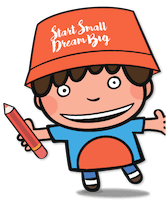Service Learning combines service objectives with learning objectives with the intent that the activity changes both the recipient and the provider of the service. This is accomplished by combining service tasks with structures opportunities that link the task to self-reflection, self-discovery, and the acquisition and comprehension of values, skills, and knowledge content. (Lake & Jones, 2012)
Recently, our Kindergarten 1 (K1) children embarked on a learning journey which led them to ‘Geylang Home for the Aged.’ This journey first started when they went to NTUC and purchased products which the home needed. These were sponsored from the kind donations of the K1 parents and families. The children grouped together and were responsible to purchase respective products which were shared with them on a grocery list.
Following this, the children packed the items into boxes and designed these boxes. With the kind help from the K1 parents and families, they volunteered to deliver these boxes to the home.
The children then took turns to visit the home and held an array of experiences with them. They performed for our seniors, played games which they had designed and made in school and assisted in the cleaning of the home.
Why?
What significance does this experience hold?
How do these experiences support the learning and development of children?
Through these experiences, children’s social and emotional development are supported as we look deeper into relationships – making connections to people and the wider community.
Service must come together with learning as it is then natural and service learning supports the moulding of character education. Even though the excursion is over, service learning does not come to a halt. The teachers, children, parents and families engage in reflection.
Reflection supports us in our thinking about the whole experience. It allows us to gather our thoughts, observations, ask questions and analyse. With any other learning experience, reflecting is part of every learning cycle. As a result, reflection allows us to transform. We transform ourselves by gaining a deeper understanding of why we do what we do and to also transform our understanding of others.


















